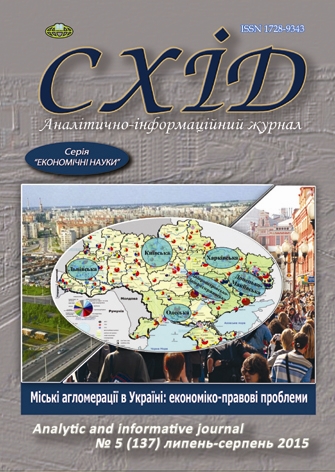Index EMBI as an indicator of country risk and its impact on the investment decision of MNC in the developing countries
DOI:
https://doi.org/10.21847/1728-9343.2015.5(137).50895Keywords:
investments, multinational corporations, developing countries, econometric analysis, correlation-regression modelAbstract
In this paper specific country risks, typical for the developing and transforming countries, in connection with their influence on the foreign direct investments (FDI) and the multinational corporations (MNCs) were investigated both theoretically and empirically. Such risks, for instance, could be protective actions of a state to protect domestic producers, discriminatory fiscal policy, bureaucracy, corruption, or even the direct threat of expropriation of the foreign affiliates of MNCs etc. The econometric analysis was made in order to study the impact of country risks on FDI and MNCs abroad. Using a regression model the author has determined the universal indicator for reflecting the risks for FDI activities in the developing countries. It was assumed that the Stripped Spread of Emerging Market Bond Index (EMBI+ Stripped Spread) may represent well a financial or investment risk in the developing country or region as far as spread is a premium or fee obtained by the international investor with the acquiry and holding the risky bonds in the developing market. This assumption was the base for the econometric regression model to use the spread of index EMBI as a proper measure of a country risk. As a result the negative relationship between the index EMBI and the foreign direct investment of MNCs was detected and confirmed like it was predicted before the analysis. Hence, the negative impact of the country risk on the FDI and activities of MNCs in the developing countries was proven empirically too.
Downloads
References
UNCTAD (2011), Global and Regional Trends of FDI Outflows in 2010 Highlights, available at : http://www.unctad.org/en/docs/webdiaeia20114_en.pdf (engl).
Broll U. and Wahl J. (2009), Mitigation of Foreign Direct Investment Risk and Hedging, Dresden Discussion Paper in Economics, № 13, 16 p. (engl). doi: 10.2139/ssrn.1552354
Desai M. A., Foley C. F. and Hines J. R. (2008), Capital structure with risky foreign investment, Journal of Financial Economics, Vol. 88 (3), pр. 534-553 (engl). doi: 10.1016/j.jfineco.2007.05.002
Deutsche Bundesbank (2006), Die deutschen Direkt investitions beziehungen mit dem Ausland: neuere Entwick lungsten denzen und makroökonomische Auswirkungen, available at : http://www.bundesbank.de/download/volkswirtschaft/mba/2006/200609mba_direktinvestitionsbeziehungen.pdf (germ).
Financial Times Lexicon (2012), Emerging market bond Index (EMBI), available at: http://lexicon.ft.com/Term?term=EMBI (engl).
Datastream Advance (2012), Emerging Market Bond Index (EMBI) Stripped Spreads in developing countries. Online Database. Thompson Reuters (engl).
EUROSTAT European Commision (2011): European Union direct investments, available at: http://epp.eurostat.ec.europa.eu/cache/ITY_SDDS/DE/bop_fdi_esms.htm (engl).
Miller T., Holmes K. R. and Feulner E. J. (2012), Index of Economic Freedom 2012. The Heritage Foundation, Waschington DC, available at: http://www.heritage.org/index/download (engl).
Außenwirtschaft: Jahrbuch 2011; Expertenwissen zu Partnern, Märkten, Recht, Steuern und Finanzierung (2010). FAZ-Institut für Management-, Markt- und Medieninformationen, Frankfurt am Main, P. 192 (germ).
Mauro P., Sussman N. and Yafeh Y. (2008), Emerging Markets and Financial Globalization: Sovereign Bond Spreads in 1870-1913 and Today, Oxford University Press, New York, P. 208 (engl). doi: 10.1093/0199272697.001.0001
Downloads
Published
How to Cite
Issue
Section
License
Copyright (c) 2015 Dmytro Babinets

This work is licensed under a Creative Commons Attribution-NonCommercial-NoDerivatives 4.0 International License.
1. Authors bear responsibility for the accuracy of facts, quotations, numbers and names used.
2. Manuscripts are not sent back.
3. The publisher does not always agree with the authors' opinion.
4. The authors reserve the right to authorship of the work and pass the first publication right of this work to the journal under the terms of a Creative Commons Attribution-NonCommercial-NoDerivatives 4.0 International License. This license allows others to distribute (copy) the published work for non-commercial purposes, provided there is mandatory attribution to its authors and a link to the first publication in our journal.
5. The authors have the right to conclude separate supplement agreements that relate to non-exclusive work distribution in the form in which it has been published by the journal (for example, to upload the work to the online storage of the journal or publish it as part of a monograph), provided that the reference to the first publication of the work in this journal is included.

